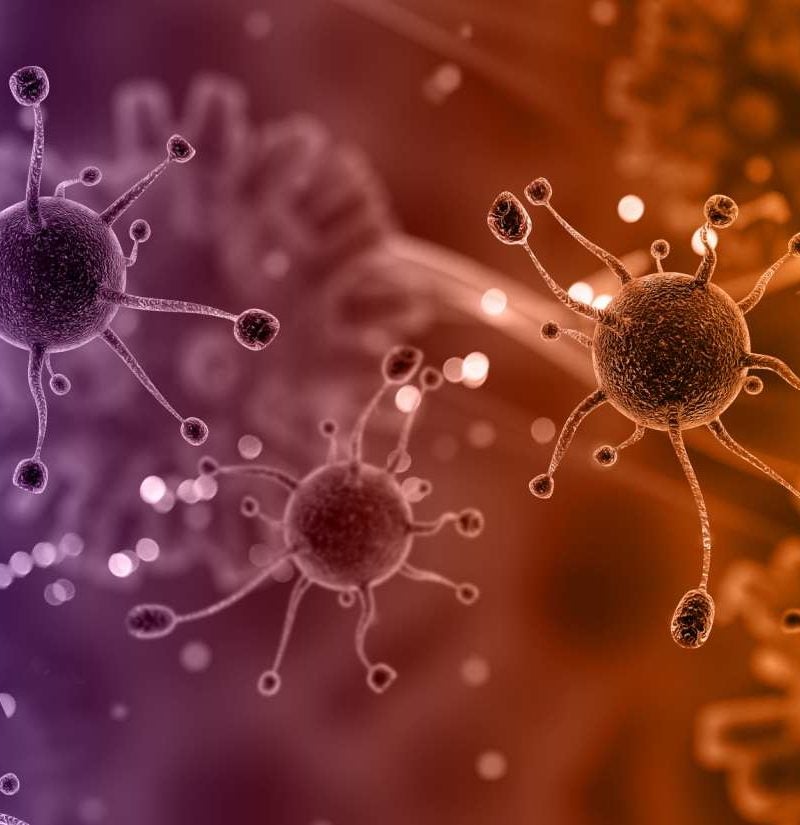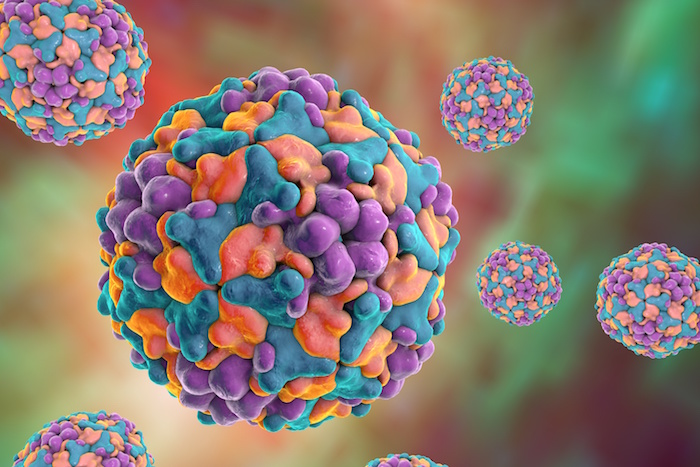Measles virus in cancer therapy. In relation to cancer, viruses are certainly better known as the cause in 20 % of human cancers:

New virus could help destroy cancer
Infection of the cancer patient with ndv.

Virus treatment for cancer. It is also a treatment for cancers that have spread (metastases) and where you have 3 or fewer metastases. Japan is expected to approve a drug for virotherapy treatment for the first time, which uses a virus to track down and destroy cancer. Virus therapy, when used in combination with immune checkpoint inhibitors such as opdivo, is expected to produce greater therapeutic effects by enabling the immune system to recognize cancer.
Nhs england has been bringing forward the use of stereotactic radiotherapy (sabr) due to the coronavirus. If you recently received cancer treatment that suppresses the immune system—such as chemotherapy, a stem cell or bone marrow transplant, or cell therapy—your doctor may suggest that you wait until your immune system has recovered before you get vaccinated. Oncolytic viruses both destroy cancer cells directly and promote immune responses against tumors—an approach dubbed immunovirotherapy.
Vaccines save lives and reduce the need for. While researchers have long viewed such viruses as potential tools for directly killing cancer, they now suspect that the viruses might be more effective at marshaling the body's immune system against malignancies, according to the national cancer institute. Public health experts and cancer specialists have agreed that people living with cancer should receive the vaccine.
And the current clinical trials of. The virus can also be inhaled. The coronavirus vaccines that are available can be given to people who are having cancer treatment.
One type of cancer vaccine is referred to as oncolytic virus therapy. Radiation therapy for pancreatic cancer. Sabr is a treatment for some types of cancers.
These viruses enter tumor cells and replicate, rupturing the cells and releasing viral progeny that attack other tumor cells and cancer proteins that trigger an inflammatory response. Oncolytic virotherapy has been investigated for several decades and is emerging as a plausible biological therapy with several ongoing clinical trials and two viruses are now approved for cancer treatment in humans. Details are listed in table 2.
However, the outcomes for patients treated with oncologic viruses has been positive, with many cases of the cancer going into remission for a very long time. They can kill the cancer outright. Oncolytic viruses are defined as genetically engineered or naturally occurring viruses that selectively replicate in and kill cancer cells without harming the normal tissues.
They can help a person’s immune system to start attacking the cancer cells If signs of cervical cancer are present, treatment options for invasive cancer include surgery, radiotherapy and chemotherapy and patients need to be referred to the right level of services. Researchers are studying 3 ways of using ndv as a possible cancer treatment:
But using viruses as protein deliverers has shown promise in testing on lab rats. Epstein barr virus causes burkitts lymphoma, hpv causes cervical carcinoma, hepatitis b and c viruses cause hepatocellular carcinoma, and. For some cancer patients, viruses engineered to zero in on tumor cells work like a wonder drug.
This type of radiotherapy uses fewer doses than conventional radiotherapy. Rats with gbm have shown a survival rate of 70 percent, without any significant unwanted effects [source: The virus then infects cancer cells, while leaving healthy cells unharmed.
This makes the cancer much harder to treat since the area has spread and removing all of the tumors surgically increases in difficulty. These viruses treat the cancer in one of three ways: Oncolytic viruses (ovs) are emerging as powerful new therapeutic agents in cancer treatment, employing nature’s own agents to find and destroy malignant cells.
Pain control for pancreatic cancer. Oncolytic virus therapy is perhaps the next major breakthrough in cancer treatment following the success in immunotherapy using immune checkpoint inhibitors. Targeted therapy for pancreatic cancer.
A virus that can kill tumor cells in culture or in animal models is known as oncolytic and its use in cancer treatment as virotherapy. Ablation or embolization treatments for pancreatic cancer. One engineered oncolytic herpes virus, imlygic.
The task now is to build on this success A genetically modified herpesvirus, talimogene laherparepvec, has already been authorized for the treatment of melanoma patients. Ndv can be injected directly into the tumor, a muscle, or a vein ( intravenous injection ), or into the colon.
Or your doctor may suggest that you wait a few weeks after vaccination to get immunosuppressive. Professor todo explained, “virus therapy is a new option for cancer treatment — only radiation therapy and chemotherapy were previously available. They can target the cancer.
For this treatment, a physician injects a genetically modified virus directly into a patient’s tumor. But there are also vaccines used for the treatment of cancer.
In mild to moderate infections, home care is usually all that is needed. Rsv goes away on its own in one to two weeks.

Respiratory Syncytial Virus (RSV) Infection The Causes
Exposure prophylaxis or treatment of disease due to respiratory syncytial virus (rsv).

Respiratory syncytial virus treatment. Supportive care is the mainstay of therapy for respiratory syncytial virus (rsv) infection. Most infections go away on their own in a week or two. The study, published in the march 2007 issue of the journal of immunology,.
If you or your child has mild symptoms, prescription treatment is usually not needed. Treating rsv is mostly about keeping yourself or your child comfortable until your immune system does its job and resolves the infection. Niaid funds several research activities to evaluate potential new therapies for rsv.
Frequent hand washing and not sharing items such as cups, glasses, and utensils with people who have rsv illness should decrease the spread of virus to others. Respiratory syncytial virus (rsv) see pictures of bacterial skin conditions see images is it possible to prevent rsv infection? By the age of two years, nearly every human child has been exposed to the virus, resulting most often in.
There is no specific treatment for rsv infection. Management and treatment how is respiratory syncytial virus (rsv) treated? Symptomatic care such as monitoring, fever control, and comfort measures are used to treat rsv.
It is highly contagious and spreads easily. Respiratory syncytial virus (rsv) is a very common infection of the lungs and respiratory tract. How should i treat rsv?
Respiratory syncytial virus infection is a common cause of morbidity and death in pediatric patients. Immunocompromised patients are a special population of which ribavirin and palivizumab may be used for treatment. Adults can get infected too.
The treatment of rsv in infants, children, and adults. If the child can take fluids by mouth and tolerate room air, outpatient management (with close physician contact as needed) is reasonable, especially in the absence of significant underlying risk factors. However, there is no evidence that ribavirin produces clinically relevant benefit in.
Keeping your child well hydrated by encouraging fluids by mouth; However, do not give aspirin to children. Respiratory syncytial virus (rsv) is one of the most common human pathogens on this planet.
Treatment of respiratory syncytial virus bronchiolitis beyond supportive care should be individualized. Respiratory syncytial virus (rsv) is a common virus that infects children and adults; The clinical manifestations vary with age, health status, and whether the infection is primary or secondary.
Respiratory syncytial virus (rsv) treatment. There is no specific treatment for rsv infection, though researchers are working to develop vaccines and antivirals (medicines that fight viruses). You should contact your healthcare provider to determine if an office visit is needed or if there are any concerns.
Almost all children are infected by two years of age, and reinfection is common [ 1 ]. Treatment for rsv may include: However, children younger than two years of age tend to develop more serious respiratory symptoms.
Rsv is the most common cause of bronchiolitis (inflammation of the small airways in the lung) and pneumonia (infection. There is no specific treatment for respiratory syncytial virus. Respiratory syncytial virus (rsv) was discovered more than 50 years ago (1, 2), and it has since been identified as the most common cause of acute respiratory tract infections in infants (3, 4).
Respiratory syncytial virus (rsv) causes acute respiratory tract illness in persons of all ages. The main treatment for rsv is rest and plenty of fluids. If necessary an intravenous (iv) line may be started to.
Antibiotics are not used to. Human respiratory syncytial virus (rsv) is a common cause of respiratory infection in infants and the elderly, leading to significant morbidity and mortality. Ribavirin is licensed for administration by inhalation for the treatment of severe bronchiolitis caused by the respiratory syncytial virus (rsv) in infants, especially when they have other serious diseases.
Most people recover in a week or two, but rsv can be serious, especially for infants and older adults. Respiratory syncytial virus (rsv) is a common virus that infects the airways and lungs. What are the treatments for respiratory syncytial virus (rsv) infections?
And do not give cough medicine to children under four. The guidance covers the development of vaccines and monoclonal antib odies for the prevention of rsv disease and direct acting antiviral agents (daas) for the treatment of rsv disease. Respiratory syncytial virus treatment is aimed at treating the symptoms, as there is no cure for the illness.
In fact, rsv is so common that most kids get infected by the age of two. Regular handwashing and good personal hygiene can stop rsv from spreading. The interdisciplinary fields, especially biotechnology and nanotechnology, have facilitated the development of modern detection systems for rsv.